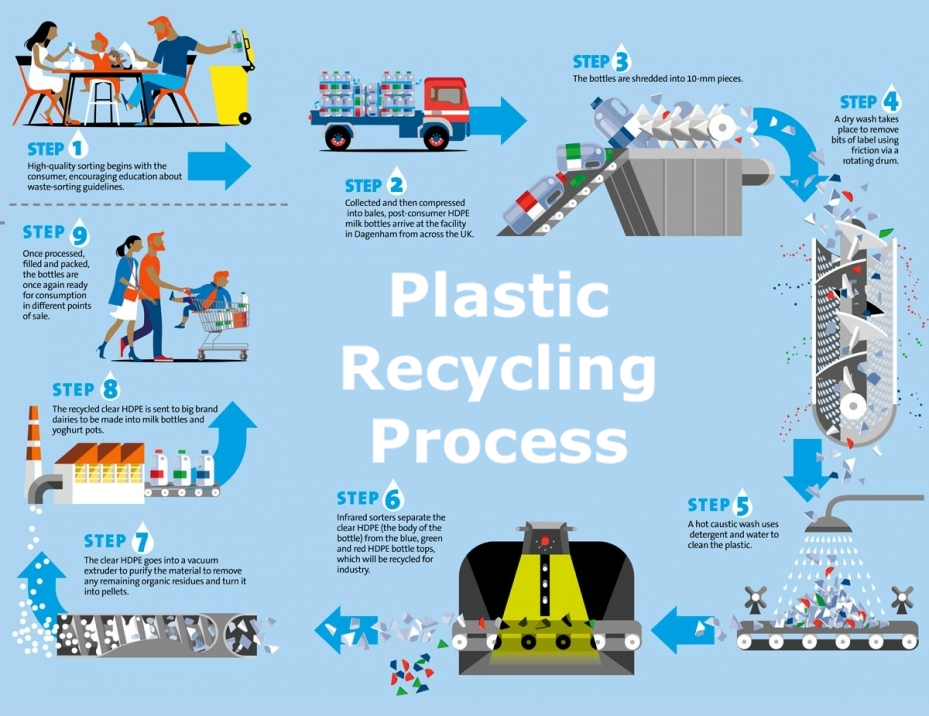Plastic pollution has become a pressing global issue, requiring effective solutions to mitigate its impact on the environment. While reducing plastic consumption and promoting reuse are essential strategies, plastic recycling plays a crucial role in addressing the plastic problem.
In this blog, we will explore how recycling complements reduce and reuse approaches in managing plastic in our society today. Next, we will highlight the significance of plastic recycling as a viable solution. There are many challenges associated with plastic recycling that we’ll discuss here as well.
Reduce, Reuse, and Recycling Approaches
These three approaches are a classic green initiative, known as the ‘3Rs’. This initiative is known globally and has a long history within our society today. However, these approaches still have their challenges and limitations.
Limited Consumer Behavior Change
While reducing plastic consumption and promoting reuse is vital, achieving widespread behavior change can be challenging. Consumer habits, convenience-driven lifestyles, and the limited availability of reusable alternatives can hinder the adoption of these approaches on a large scale.
Incomplete Elimination of Plastic Waste
Reducing, reusing, and recycling plastic can minimize waste generation, however, certain plastic items, such as packaging and single-use products, remain unavoidable in certain industries and situations. Complete elimination of plastic waste through reduction, reuse, and recycling may not be feasible, however, a good recycling method can significantly minimize used plastic from entering the waste stream.
Next cycle-of-Life
Proper management of existing plastic waste is essential, requiring a comprehensive solution that includes reducing, reuse, and recycling. In addition, it is also critical to include ‘the next cycle of life’ as part of the design considerations in any product development project.
The Significance of Plastic Recycling
Plastic recycling elicits a myriad of perspectives. While some are staunch advocates, others harbor doubts about its effectiveness and the lofty claims it makes. Additionally, there exist individuals who oppose it altogether.
Nonetheless, it is crucial to recognize that petroleum-based plastic requires approximately 400 years to decompose, and a staggering 380 million metric tonnes of plastic are generated annually. This stark reality underscores the significance of recycling as an indispensable method for managing the vast quantity of plastic we have produced thus far. The following are three primary benefits of plastic recycling:
Resource Conservation
Plastic recycling conserves valuable resources by recovering and reusing materials from plastic waste. It reduces the demand for virgin materials, such as fossil fuels and natural resources, used in the production of new plastics.
Waste Diversion
Recycling diverts plastic waste from landfills and incineration, minimizing environmental pollution and associated greenhouse gas emissions. It extends the lifecycle of plastics, conserves materials, and reduces the need for raw material extraction.
Energy Savings
Recycling plastic requires less energy compared to producing new plastic from virgin materials. This energy-saving aspect of recycling contributes to reducing carbon emissions and mitigating climate change.
Nevertheless, the current plastic recycling programs have their challenges. Below are the challenges that we aim to tackle:
Contamination Issue
Contamination of plastic waste with non-recyclable materials hampers the recycling process. Contamination challenges decrease the quality and value of recycled plastics. Cross-contamination of different types of plastic also ruins the plastic and renders it unusable.
Sorting Complexity
Sorting different types of plastics accurately is a complex task, as various plastics require different recycling techniques. Most often people discard all types of plastic together. Sometimes along with other recyclables like wood, paper, metal, and glass, etc. The mixing up of different materials makes material sorting challenging and costly. Plastic not only needs to be separated from other waste, but it also needs to be sorted by type as well.
Lack of Recycling Infrastructure
Insufficient recycling infrastructure, including collection systems, sorting facilities, and recycling plants, poses a challenge to plastic recycling. Inadequate infrastructure limits the capacity to handle the increasing volume of plastic waste effectively.
Economic Viability
Recycling operations face economic challenges due to fluctuating market prices for recycled plastics and higher costs associated with collection, sorting, and processing. The availability of cheaper virgin plastic can impact the demand for recycled materials.
Technological Limitations
Certain types of plastic, like multi-layered packaging or mixed plastics, present technical difficulties in recycling. The limited availability of advanced recycling technologies and processes restricts the ability to recycle these complex plastic materials.
Consumer Education and Participation
Lack of awareness and understanding among consumers about proper recycling practices and the importance of separating different plastic types hampers recycling efforts. Many people dump all unused stuff e.g. umbrellas, shoes, appliances, etc. in recycling bins believing it may be recycled. Most of such waste cannot be recycled which makes it difficult and costly to extract recyclable material out of the waste. Educating and engaging consumers is crucial to improve recycling rates and minimize contamination.
Conclusion
While reducing plastic consumption and promoting reuse are crucial in addressing the plastic problem, the significance of plastic recycling cannot be understated. Plastic recycling assumes a pivotal role in managing plastic waste by conserving valuable resources and diverting waste from landfills.
A drastic change is critical in the way we manage plastic waste today. It is vital to confront obstacles such as contamination, infrastructure limitations, lack of consideration for the next life cycle, economic viability, and the need for consumer education to ensure the effectiveness of plastic recycling. Overcoming these challenges and fostering sustainable and circular plastic recycling practices necessitates a collective effort involving governments, industries, consumers, and recycling stakeholders.
Got a question?
Let’s discuss on our Facebook community of sustainability experts and enthusiasts helping us to build the future of plastic recycling.
Let’s go circular together!

